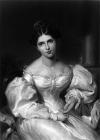Are they indeed the bitterest tears we shed
Those we let fall over the silent dead?
Can our thoughts image forth no darker doom,
Than that which wraps us in the peaceful tomb?
Whom have ye laid beneath that mossy grave,
Round which the slender, sunny grass-blades wave?
Whom are ye calling back to tread again
This weary walk of life? towards whom, in vain,
Are your fond eyes and yearning hearts upraised;
The young, the loved, the honoured, and the praised?
Come hither;look upon the faded cheek
Of that still woman, who with eyelids meek
Veils her most mournful eyes;upon her brow
Sometimes the sensitive blood will faintly glow,
When reckless hands her heart-wounds roughly tear,
But patience oftener sits palely there.
Beauty has left herhope and joy have long
Fled from her heart, yet she is young, is young;
Has many years, as human tongues would tell,
Upon the face of this blank earth to dwell.
Looks she not sad? 'tis but a tale of old,
Told o'er and o'er, and ever to be told,
The hourly story of our every day,
Which when men hear they sigh and turn away;
A tale too trite almost to find an ear,
A woe too common to deserve a tear.
She is the daughter of a distant land;
Her kindred are far off;her maiden hand,
Sought for by many, was obtained by one
Who owned a different birth-land from her own.
But what recked she of that? as low she knelt
Breathing her marriage vows, her fond heart felt,
"For thee, I give up country, home, and friends;
Thy love for each, for all, shall make amends;"
And was she loved?perishing by her side
The children of her bosom drooped and died;
The bitter life they drew from her cold breast
Flickered and failed;she laid them down to rest:
Two pale young blossoms in their early sleep;
And weeping, said, "They have not lived to weep."
And weeps she yet? no, to her weary eyes,
The bliss of tears her frozen heart denies;
Complaint, or sigh, breathes not upon her lips,
Her life is one dark, fatal, deep eclipse.
Lead her to the green grave where ye have laid
The creature that ye mourn;let it be said:
"Here love, and youth, and beauty, are at rest!"
She only sadly murmurs, "Blest!most blest!"
And turns from gazing, lest her misery
Should make her sin, and pray to Heaven to die.






